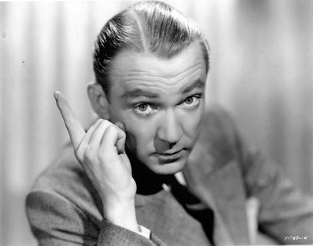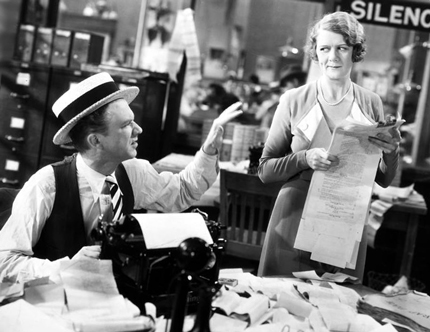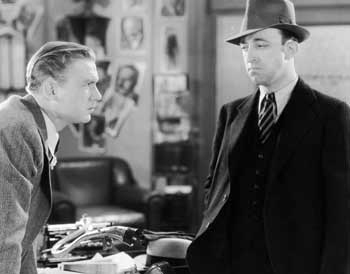
 |
|
|
|
We're told that the early talkies scoured the New York theater scene for talent. Warner Bros. came back with a cartload of exciting personalities that specialized in rattling off slick, street-wise dialogue. Sassy, sharp-tongued actors became extremely popular because the public preferred people it could identify with to artistes with polished voices. Joan Blondell and Glenda Farrell competed neck and neck for the title of wisecracking dame deluxe. Nobody could touch James Cagney's inimitable style, which bundled a full catalog of body motions, dance attitudes and electric line deliveries into one dynamic package. 
Drawing attention from Cagney for a few months was actor Lee Tracy, a Broadway star since 1924. Like Cagney, Tracy specialized in nervy, fast-talking hucksters and conmen, or big-thinking idea boys whose grandiose plans get out of control. His claim to fame was the starring role of Hildy Johnson in the original stage production of The Front Page, a part later claimed by Pat O'Brien, Rosalind Russell and Jack Lemmon in films by Lewis Milestone, Howard Hawks and Billy Wilder. In his own pictures, Tracy played a publicity man with wild ideas to exploit dancer Lupe Veléz in The Half-Naked Truth and a newspaper columnist in Advice to the Lovelorn. Lee Tracy's most celebrated star outing is 1932's Blessed Event, the snappy, uncompromised tale of another ambitious big-city newspaper columnist. Assistant columnist Al Roberts (Tracy) is given a main column while his safe-playing boss George Moxley (Ned Sparks) is away. Ignoring instructions, Al wastes no time putting his ideas into effect. He fills the column with whatever dirt he can find on anybody in the public spotlight, using gossip gleaned from paid informants. Al specializes in "blessed event" blurbs that reveal what couples are expecting a baby. The column increases the paper's circulation, which results in Al pulling George's job out from under him. Al ignores his secretary Stevey Stevens (Ruth Donnelly) when she warns that his method is making enemies right and left. Respectable people don't like seeing their personal business printed as gossip. Local racketeer Sam Gobel (Edwin Maxwell) takes exception to his extra-marital affairs being outed: his wife in the suburbs thinks he's a respectable contractor. As Al's fortunes rise he gains more power and becomes even more convinced that he can't be stopped. His girlfriend, fellow newspaperwoman Gladys Price (Mary Brian) won't marry him unless he quits his disgraceful but lucrative column. Al maintains a running feud with bandleader Bunny Harmon (singer Dick Powell in his first film). He's determined to continue embarrassing Harmon simply because the feud makes good copy. When Gobel sends the hit man Frankie Wells (Allen Jenkins) to rough Al up, the fast-thinking columnist instead convinces Frankie that he's made an audio recording of Frankie confessing to a murder. After mercilessly destroying the reputation of Gobel's mistress Dorothy Lane (Isabel Jewell), Al has misgivings but cannot convince her that he wants to make amends. Things come to a head when Al decides to sneak into a special Bunny Harmon broadcast event to show he's not afraid of the bandleader. Gobel's henchmen are there waiting to kill him. 
Directed by Roy Del Ruth at a breakneck pace to keep up with Lee Tracy's non-stop patter, Blessed Event captures a certain public fantasy of how success is obtained in the big city. The dynamic Al Roberts is beating Old Man Depression by throwing all caution to the wind and living by his wits alone. He earns big rewards by disobeying his superiors; he victimizes women in trouble and worries about the consequences later. When he slanders a roughneck gangster, he gambles that his powers of persuasion will keep his neck out of the wringer. In the film's best scene Al terrorizes the dumbstruck Frankie Wells by verbally dramatizing the gruesome spectacle of the electric chair. The Production Code forbade execution scenes but Lee Tracy's speech is worthy of a campfire horror tale. Later movies curbed by the Code office might introduce a supposedly heartless or corrupt hero, only to reveal that he was a sentimental softie all along: James Cagney's Angels with Dirty Faces derives its hypocritical appeal by playing up this dichotomy. But Al Roberts in Blessed Event is never really contrite. Besides weathering the disapproval of Mary Price, Al can also slough off the protests of a young female journalism major disillusioned by his corrupt way of doing business. And he never tells his mother (the mother he lives with) what he's up to; she thinks he's a beloved figure. A particular standout is Isabel Jewell, who seemed to specialize in fallen women and alcoholic losers (Lost Horizon, The Seventh Victim). Al really gives Dorothy a dirty deal. When he learns of her suffering, he gives the strangest reaction, as if he has willed himself into a state of denial about what he does to others -- Dorothy is just collateral damage. Blessed Event is uncompromised in that Al expresses his sorrow, but never repents his reckless ways. 
Instead, we're laughing. Al sneaks into the big ball at the finish by donning a pair of sunglasses; his equally cynical journalist buddies don't tell the event's security official (Frank McHugh) that he's standing right next to the man banned from the ballroom. The picture benefits from excellent supporting performances. Allen Jenkins is fully entertaining as the thug brought to heel because he thinks Al is holding that incriminating audio recording. Ruth Donnelly's marvelous Girl Friday expresses her disapproval of Al's every action, and is fascinated when his outrageous behavior results in even greater success. This leaves Al free to challenge the cheerful Bunny Harmon live on the radio -- while giving Gobel's assassin (fave oily gangster Jack La Rue) a clear shot at him. Dick Powell is barely in the picture but sings quite a bit, setting himself up for a future in Busby Berkeley musicals. But Lee Tracy makes the biggest impression, earning his spot as an early-talkie original, the cynical, morally challenged All-American go-getter. 1 
The Warner Archive Collection DVD-R of Blessed Event is a very good transfer of film elements in worn but good condition. The image is strong and the soundtrack solid, an important factor when trying to follow all the fast dialogue. An original trailer is included. Lee Tracy passed away in 1968 and was not one of the actors of the '30s to enjoy a revival of popularity. But he worked constantly on TV. He's perhaps best noted as playing a fictitious President of the United States in the film version of Gore Vidal's political drama The Best Man.
On a scale of Excellent, Good, Fair, and Poor,
Blessed Event rates:
Footnotes:
1. Anybody know the story of those prominent scars on both sides of Lee Tracy's neck? He was a Lieutenant in WW1 -- it almost looks like he was shot, or hit by shrapnel. I have no idea whether he saw combat, or had an accident or was cut in a fight. Perhaps some unskilled doctor removed a pair of infected glands... ?
Reviews on the Savant main site have additional credits information and are often updated and annotated with reader input and graphics. Also, don't forget the 2011 Savant Wish List. T'was Ever Thus.
Review Staff | About DVD Talk | Newsletter Subscribe | Join DVD Talk Forum |
| ||||||||||||||||||